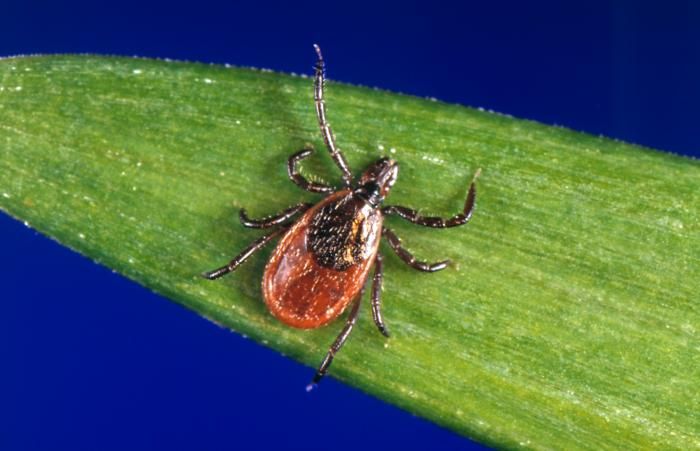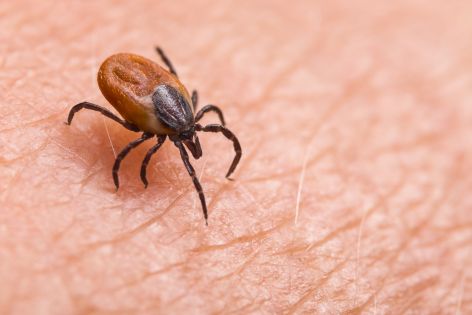.
Why Did God Make Ticks?.
 “Kids ask some of the most interesting questions. Sometimes they aren’t the easiest questions to answer either! Have you ever wondered why God made ticks?
“Kids ask some of the most interesting questions. Sometimes they aren’t the easiest questions to answer either! Have you ever wondered why God made ticks?
I was sitting in the urgent care waiting room trying not to touch anything that might have germs on it when a lady and several young boys came in. I didn’t think it would be polite to stare, so I really don’t know if there were three or four boys in constant motion around the waiting room.
One young voice told another to stop scratching.
Poison ivy, I thought. Then another young boy asked the harried mother, “Who made ticks?”
Who made ticks?
That question threw me in a couple of ways. Maybe my “diagnosis” had been wrong—or maybe one boy had poison ivy and another had been bitten by a tick. No wonder the mother seemed harried!
And, more importantly, I wondered how I would answer that question.
The boy asked again, “Who made ticks?”
The mom answered distractedly, “God did. God made everything.”
That’s a very good answer, I thought. But I suspect it didn’t answer the real question in the boy’s mind: Why did God make ticks? Why would a good God make a mean creature like a tick that hurts little boys and can carry terrible diseases?
It’s not a light question, since around 50,000 tickborne diseases are reported each year just in the United States. And the CDC lists at least 16 pathogens carried by ticks, including those that cause Lyme disease and Rocky Mountain spotted fever.
So, why would God create ticks? How would I answer that?
God made everything “very good”
The mother was absolutely right. The Bible records God’s claim that He created everything through Jesus Christ:
“In the beginning was the Word, and the Word was with God, and the Word was God . . . All things were made through Him, and without Him nothing was made that was made” (John 1:1, 3). (See more about this in our articles “Proof of God” and “Creation vs. Evolution” and related articles.)
But the Bible also tells us that the things God made were good: “Then God saw everything that He had made, and it was very good” (Genesis 1:31).
But things didn’t stay good
Many scriptures point out that not everything stayed good. Starting with Lucifer who sinned and became “corrupted” (Ezekiel 28:13-17; Isaiah 14:12-15), the whole earth has become “subjected to futility” and in “bondage of corruption” (Romans 8:20-21).

God made ticks. But He didn’t make them to torment us or make us sick.
After Adam and Eve sinned, God told Adam that his sin would result in the ground being cursed and bringing forth thorns and thistles (Genesis 3:17-18).
What exactly did this corruption and curse mean? Did thorns and thistles become more prevalent and more of a problem? Could the same thing apply to mosquitoes, fleas—and ticks? What about the dangerous wild animals? Adam named all the animals with no fear. But later mankind had to fear the wild animals.
I don’t know exactly what ticks were like before the curse or how they might have changed. But I am confident that they were a good part of God’s creation and that the current problems they cause were not God’s original intent.
God made ticks. But He didn’t make them to torment us or make us sick.
Restoration: the curse will be reversed
When the apostle Paul wrote about the creation being in “bondage to corruption,” he also added this hope: “The creation itself also will be delivered from the bondage of corruption into the glorious liberty of the children of God. For we know that the whole creation groans and labors with birth pangs together until now” (Romans 8:21-22).
When those birth pains of the end times are complete, Jesus Christ will return and bring “times of refreshing” and the “restoration of all things” (Acts 3:19-21).
The curse will be reversed, and dangerous wild animals like wolves, leopards, lions and cobras will no longer be dangerous (Isaiah 11:6-8). “They shall not hurt nor destroy in all My holy mountain,” God said (verse 9).
Could this also apply to mosquitoes, fleas—and ticks? I sure hope so.” From: https://lifehopeandtruth.com/god/blog/why-did-god-make-ticks/?
For more about the promised restoration when Jesus Christ establishes the Kingdom of God on earth, download our booklet The World to Come: What It Will Be Like.
_______
Let No One Say He Is Tempted
“(13) Let no one say when he is tempted, "I am tempted by God"; for God cannot be tempted by evil, nor does He Himself tempt anyone. (14) But each one is tempted when he is drawn away by his own desires and enticed. (15) Then, when desire has conceived, it gives birth to sin; and sin, when it is full-grown, brings forth death.”
Exodus 20:17
(17) "You shall not covet your neighbor's house; you shall not covet your neighbor's wife, nor his male servant, nor his female servant, nor his ox, nor his donkey, nor anything that is your neighbor's."
Every problem, individual or national, has its root embedded in sin. But what causes sin? Wrong desires brought to fruition, and everyone—from peasant to king—is subject to wrong desires. From the beginning of time, sinners have blamed their sins on others. Satan blamed God, Eve blamed Satan, and Adam blamed Eve. James sternly rebukes this.
God does not cause sin, nor do things. Sin would be helpless if it did not appeal to something in man. Sin appeals to man's human nature through his desires. If a man desires long enough, the consequence is virtually inevitable. Desire becomes action.
Desire can be nourished, stifled or—by the grace of God—eliminated altogether. If we humbly, thoughtfully, and wholly give of ourselves to Christ and involve ourselves in good activities and thoughts, we will have precious little time or place for evil desires. The tenth commandment pierces through surface Christianity, really showing whether we have surrendered our will to God.
The spiritual requirements for keeping it are in some ways more rigid than any other because it pierces directly into our thoughts. II Corinthians 10:4-5 sets a very high standard for us to shoot for:
For the weapons of our warfare are not carnal but mighty in God for pulling down strongholds, casting down arguments and every high thing that exalts itself against the knowledge of God, bringing every thought into captivity to the obedience of Christ.
These verses, revealing God's authority over even our thoughts, also sets what may be our ultimate goal in this life. The tenth commandment shows the depth of God's concern about the state of our inner character as well as our apparent character. If our thoughts are right, our actions will be too. Changing our thinking strikes right at the heart of character, emphasizing why spending time with God, in studying His Word and in prayer, is so important.” From: https://www.theberean.org/index.cfm/main/default/id/961/ver/NKJV/james-1-13-15.htm
_______
DDT in Umbilical Cord Blood
Below is an approximation of this video’s audio content. To see any graphs, charts, graphics, images, and quotes to which Dr. Greger may be referring, watch the video.
Transcript of YouTube: https://youtu.be/mIBoW4cHQyQ
“Are pregnant women who eat fish, other meat, and dairy still passing along the pesticide DDT—even decades after it was banned?
Just because mothers have a certain level of industrial pollutants in their fat tissue or bloodstream doesn’t necessarily reflect what they’re passing on to their child. So, researchers last year decided to measure pesticide levels right out of umbilical cord blood—at delivery, as soon as you cut the cord. They squirt a little in a vial before they tie it off.
318 mothers studied, and even now, decades after it was banned, “…almost all [umbilical cord blood] samples (95%) showed detectable DDT residues.” Not exactly the first thing we want to be passing along to our newborns.
The most common DDT residue found was a derivative called DDE, which was found most closely associated with the mother’s consumption of three types of foods. Because organochlorine pesticides are attracted to fat, they accumulate in foods of animal origin. “[M]eat, fish, and dairy products were associated with… [the presence of] DDE in umbilical cord serum.” From: https://nutritionfacts.org/video/ddt-in-umbilical-cord-blood/
_______













No comments:
Post a Comment